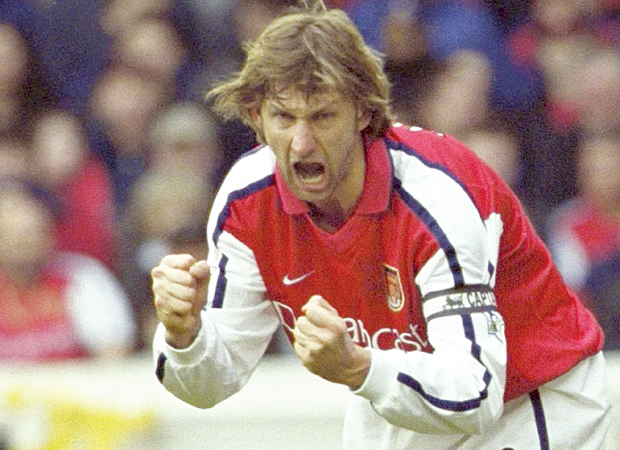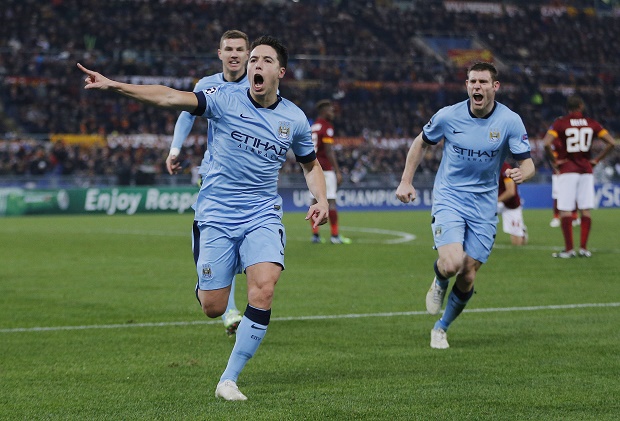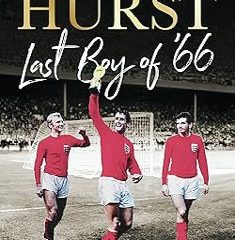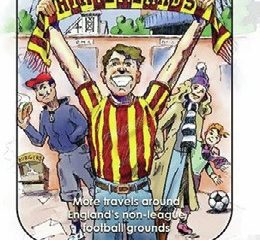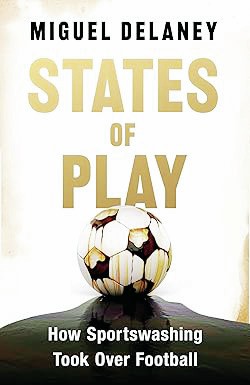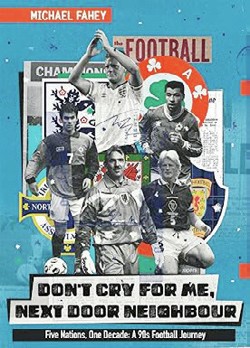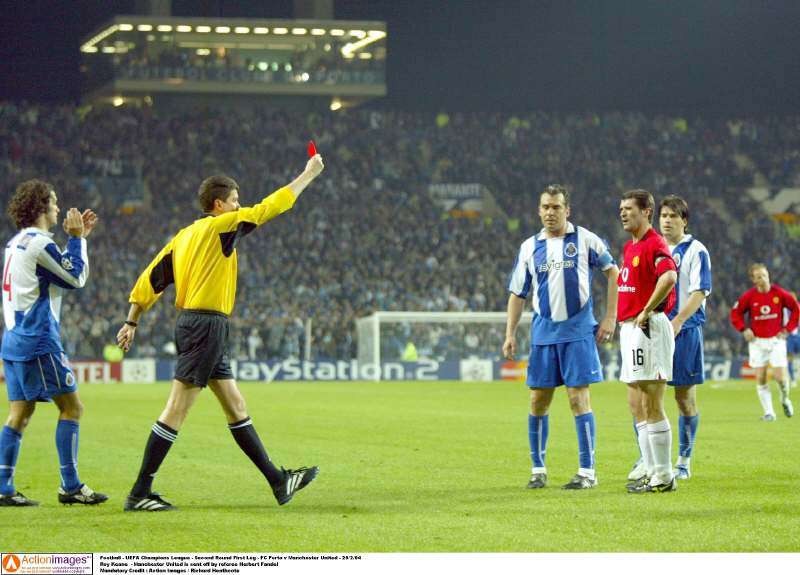

Football – UEFA Champions League – Second Round First Leg – FC Porto v Manchester United – 25/2/04
Roy Keane – Manchester United is sent off by referee Herbert Fandel
Mandatory Credit : Action Images / Richard Heathcote
By John Lyons
When you went to a football match 20 or 30 years ago, a crunching 50-50 tackle between two players would probably come only secondary to a goal in the entertainment stakes.
But think about it, how often these days do you see a full-blooded, hard but fair challenge between two rivals? Not often is probably the answer.
Football has, in many ways, improved for the better over the last few decades. The outlawing of the tackle from behind, which pretty much allowed defenders a free hit at an attacker with the all-encompassing ‘I got the ball’ get-out clause, has allowed the flair players to shine.
Messi and Ronaldo have it much easier than the strikers of yesteryear who took fearsome blows and simply had to get on with it.
But is the game going too far in the attacking players’ favour? Will tackling soon be outlawed completely? It is, after all, a skill in itself. The fancy dans can’t do their stuff if their team hasn’t got the ball.
Back in the day, every team seemed to have a hard man, a player the other team feared, an enforcer. It’s hard to think of even one these days. They’d probably be permanently suspended. Of course, these players were no angels, they sometimes overstepped the mark, but they gave 100 per cent to the cause, didn’t go missing in the white-hot heat of battle and were often fans’ favourites.
Some could play a bit, too, but it was their ability to win the ball, to get stuck in that made them so valuable to their teams.
Would England have won the World Cup without the combative Nobby Stiles?
In ‘Where do I go from here? George Best, An Autobiography’, the Irishman said: “The halfback line was put together beautifully. Paddy (Crerand) was the constructive halfback, as Matt Busby was in his playing days, while Bill (Foulkes) and Nobby (Stiles) were more physical.
“I wouldn’t say they roughed people up, but they did make them move. Even though we had a reputation for being a footballing side, no team had an easy game against us. These two, in the heart of the defence, could take care of themselves, which is what every team needs.
“But there’s a difference between being hard and being dirty. The reputation Nobby Stiles had in Europe and in South America – assassin was their nicest word – was quite undeserved and was based almost entirely on his superb marking of Eusebio in the 1966 World Cup and the 1968 European Cup final.”
One of the players that stood out in the hard man mould for me as a child was Liverpool midfielder Graeme Souness.
In ‘Glenn Hoddle, An Autobiography’, the Tottenham playmaker gave an excellent summary of Souness’ commitment.
“Any opponent needs to keep half an eye out for Graeme. His loyalty to Liverpool’s cause, to his team-mates and to his manager means that he will go in for the ball even when the odds are stacked against him,” he said.
“So even if it looks 70-30 in my favour I always know that nothing will deter Graeme from coming steaming in. It’s probably because of this attitude, this super-enthusiasm, that he has gained his reputation as one of the game’s hard men.”
Tottenham, of course, had their own warrior in Graham Roberts, and Arsenal’s Charlie Nicholas probably still has nightmares about him now from their New Year’s Day clash 30 years ago. Roberts tells the tale in ‘Hard As Nails, The Graham Roberts Story’.
“Nothing much happened until just after half-time when Arsenal cleared one of our corners and quickly played the ball out to Charlie Nicholas,” he said. “I spotted the danger and rushed back hoping to make an interception, but Charlie got to the pass just in front of me.
“I was travelling at a fair rate of knots and as the pitch was pretty slippy there was no way I was for stopping. If I couldn’t get the ball then I was going to make sure I got the man. I raised my elbow and clattered into Charlie who went sprawling over a metal railing and into the crowd.
“It was a shocking challenge and there would have been no complaints if the referee had shown me a red card. Normally I was always hard but fair. This was brutal and unfair.
“Thankfully, Charlie was OK because he could have really suffered a serious injury. As he was flying into the Highbury main stand, my momentum had taken me careering into the Arsenal dug-out. “There were bodies everywhere and I remember their physio asking me if I was alright as I was on my hands and knees. “I’m fine, thanks,” I said. “Well, you’re not now,” he replied, before decking me with a right hook. The cheeky bastard connected right on my nose and there was blood everywhere. “All hell then broke loose as the two benches became embroiled in a mini riot while the Arsenal fans were baying for even more of my blood. It was mayhem and when it all calmed down I was the only one to get booked.
“And every game after that the Spurs fans used to chant: “Who put Charlie in the stand? Robbo, Robbo!”
Another Spurs star Paul Gascoigne no doubts remembers Vinnie Jones giving his crown jewels a squeeze in the latter’s Wimbledon days.
And ex-Scotland international midfielder Gordon Strachan was just happy to have Jones and the equally combative David Batty on his side in his Leeds days rather than come up against them. In his Book, Gordon Strachan, My Life in Football, he tells a great tale about Jones and David Batty before a game against Middlesbrough.
“As I was heading for the dressing room to get changed, I’d caught sight of Middlesbrough midfielders Mark Brennan and Trevor Putney, two lovely lads who just said hello and asked how I was,” he said.
“However, I gave a different version of the conversation when, having noticed that the atmosphere among our players was somewhat flat, I decided that the ideal way to lift it would be to tell Vinnie and David that Mark and Trevor had insulted them. “I said, ‘I have just seen Mark Brennan and Trevor Putney, and they told me, ‘We can’t wait to face Jones and Batty. They’re no more than two hammer-throwers. If we can’t play well against them we can’t play well against anybody’’.
“Suddenly, Vinnie and David were like two caged lions. Even more disconcerting was that, in psyching themselves up to make Mark and Trevor pay for what they had ‘said’, they were growling like lions and slapping and punching each other. I thought: Hang on, this is a bit over the top, isn’t it? What have you done?
“In the match itself, Vinnie and David were kicking lumps out of Mark and Trevor (and everybody else in a Boro shirt). Deep down I did feel embarrassed, if not a little ashamed of myself, especially during a break in the play near the end.
“We were 2-0 up and Vinnie, standing next to Trevor and calling him all the names under the sun, tapped him on the head and shouted to me: ‘Hey, skip, what was it this ****** said about me?’ Trevor looked at me as if to say: ‘What’s he talking about?’ I just mumbled something and turned away.”
It’s clear the game has changed markedly over the years, though former Manchester United star Denis Law felt forwards needed protection earlier.
In ‘Denis Law, An Autobiography’, he said: “Defenders were given the job of marking a key player and then, when the trouble started, it was the forward who got sent off although he was usually the one who was being kicked.
“Matt Busby used to say ‘count to ten’. I never got past five. If a fellow gave me a crack, I lost my temper there and then and I’d want to crack him back. I couldn’t switch it on and off like an electric light bulb. Some players could wait half an hour and then take retribution. That to me really was premeditated violence. If I was going to retaliate it came out in the heat of the moment.
“Instead of bleating about bad conduct on the field, the game’s administrators should have done far more than they did to protect players from rough tackling.
“People pay their money to watch skilful players performing to the best of their ability, not to see them being hacked down by hired assassins. The FA did of course introduce the restriction on tackling from behind in the early seventies, and that was an improvement for a time, but it was too little and too late.
“For one thing it was too late to stop Jimmy Greaves hanging up his boots prematurely. One of the reasons Jimmy quit the game was because he was sick of being kicked and getting no protection from referees.”
Man-marking used to be a common feature. Get one of your players to follow an opposition team’s star player’s every move and try to make it a 10v10 game. Of course, the prospect of the marker picking up yellow and red cards soeasily these days is probably one reason for its demise.
Talking about man-markers, Trevor Brooking gave a good explanation in ‘Trevor Brooking, An Autobiography’.
“The player who has done the task better than anyone in my experience is the relatively unknown Gordon Coleman of Preston North End, a lad from Nottingham who has played more than 200 League games,” he said.
“Whenever we have played Preston, he has never been a yard from me. I cannot say I have enjoyed playing in matches when I have been shadowed so effectively but I guess the other fellow is not enjoying it much either.
“In Italy this oppressive close marking goes on in every match and is one reason why I would not like to play there.”
Talking of Italy, legendary defender Claudio Gentile was renowned as one of the toughest man-markers around in the 70s and 80s. After his aggressive display against a young Diego Maradona in the 1982 World Cup in Spain, he famously said: “Football is not for ballerinas!”
The likes of Norman ‘Bites Yer Legs’ Hunter, Ron ‘Chopper’ Harris, Tommy Smith, Julian Dicks and Roy Keane would no doubt agree


Book Reviews
Book Review: Chris Towers finds right mix

Book Reviews
Book Review: Sir Geoff Hurst hits net
